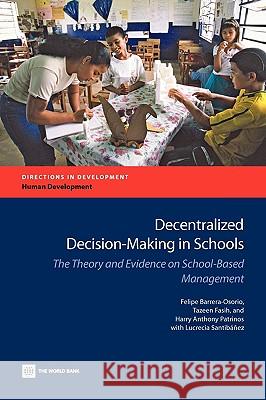Decentralized Decision-Making in Schools: The Theory and Evidence on School-Based Management » książka
Decentralized Decision-Making in Schools: The Theory and Evidence on School-Based Management
ISBN-13: 9780821379691 / Angielski / Miękka / 2009 / 124 str.
An increasing number of developing countries are introducing school-based management (SBM) reforms that are aimed at empowering principals and teachers or at strengthening their professional motivation, thereby enhancing their sense of school ownership. Many of these reforms have also strengthened parental involvement in the schools. SBM programs take many different forms in terms of who has the decision-making power and the degree of decision making that devolves to the school level. While some programs transfer authority only to school principals or teachers, others encourage or mandate parental and community participation, often through school committees. SBM has the potential to become a low-cost way of making public education spending more efficient by increasing the accountability of those involved and by empowering those individuals to improve learning outcomes. 'Decentralized Decision-Making in Schools' reviews more than 20 country experiences with SBM in Africa, Asia, Europe, Latin America and the Caribbean, the Middle East and North Africa, and North America. For each country, the authors provide a brief description of the SBM reform along with any evidence regarding its impact on a variety of indicators, from student test scores and dropout and retention rates, to parent and teacher perceptions of the reform's benefits. Overall, the authors found that SBM has had a positive impact on some variables--mainly in reducing repetition and failure rates, and in improving attendance rates--but has had mixed results on others such as test scores, possibly due to the timing of the reform. 'Decentralized Decision-Making in Schools' will be useful to teams preparing education projects with an emphasis on decentralized authority, to education officials interested in school reform, and to governments worldwide looking to improve education for all students.











